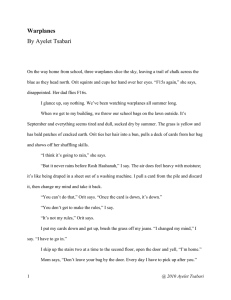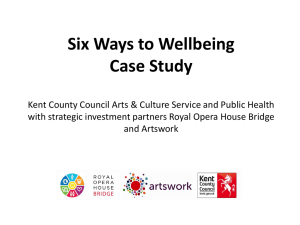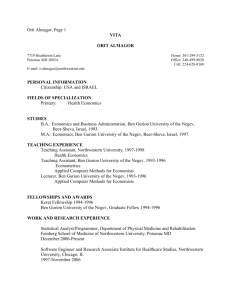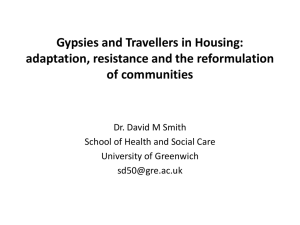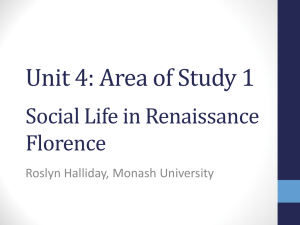What`s so hard about hevruta learning?
advertisement
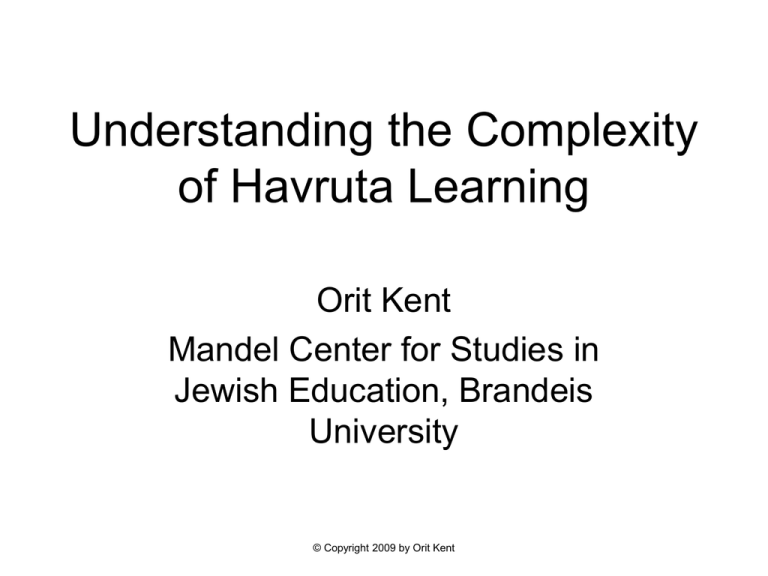
Understanding the Complexity of Havruta Learning Orit Kent Mandel Center for Studies in Jewish Education, Brandeis University © Copyright 2009 by Orit Kent The Directive "Our future depends on our ability to provide children with opportunities to become 'different individuals'-individuals who know how to listen, who acknowledge and respect diverse points of view, who work with others to solve complex problems, and who can interpret and understand the world in increasingly complex ways." (294) -Mara Krechevsky & Ben Mardell, “Four Features of Learning in Groups” © Copyright 2009 by Orit Kent Purposes of Session 1. Begin noticing complexity of havruta learning and all that it entails 2. Develop language for talking about what we see taking place in havruta 3. Identify practices involved in havruta learning and their potential impact © Copyright 2009 by Orit Kent Three Partners of Havruta Text Study Text Context overlies everything Person Person © Copyright 2009 by Orit Kent Understanding havruta as a… Jewish A historic Jewish approach that is now being used in modern settings Interpretive Based around meaning-making activity (not just summarizing or translating) Social Assumes learners are partners – working with, learning from and responsible to and for each other Learning Practice Not just techniques; potential for learning about oneself, the text, one’s partner and life; emphasizes learning through doing © Copyright 2009 by Orit Kent Three Streams of Related Research • Text interpretation and interpretive discussion, e.g. Sophie HaroutunianGordon • Collaborative/Cooperative learning, e.g. Elizabeth Cohen • Classroom Discourse, e.g. Sarah Michaels, “accountable talk” © Copyright 2009 by Orit Kent Six Havruta Practices (Kent, 2008) Supporting Wondering Focusing Challenging © Copyright 2009 by Orit Kent Background to Case • 4th havruta meeting • Debbie: 2nd summer of DeLeT; attended Hebrew schools and Hebrew high school, majored in Jewish studies and attended seminary in Israel for 3 months • Laurie: 1st summer of DeLeT; attended Jewish day school for 9 years and took Jewish studies courses in college © Copyright 2009 by Orit Kent Listening and Articulating Definition: paying attention to (can have multiple foci of attention) Kinds: following along, understanding the other, getting ideas from the other, figuring something out © Copyright 2009 by Orit Kent Listening and Articulating Definition: Expressing one’s ideas out-loud Kinds: •Thinking out loud, stream of consciousness of ideas, “exploratory talk” •Stating an interpretive idea in order to a. hone your idea, b. elicit a response, or, c. make a claim © Copyright 2009 by Orit Kent Listening and Articulating in Havruta Person # 2 Person #1 Listen Listen Articulate No one’s ideas are articulated clearly enough to work with them Person #2’s ideas take center stage Listen & Articulate Ideas are Person #1’s ideas verbalized but no Articulate take center stage space to reflect on them together Listen and Articulate Take turns listening and articulating ideas © Copyright 2009 by Orit Kent How do we listen to all three partners simultaneously? Text Context overlies everything Person Person © Copyright 2009 by Orit Kent Focusing and Wondering WONDERING: feeling curious FOCUSING: concentrating attention Often takes form of zeroing in on a particular idea or textual interpretation. Need this in order to deepen an interpretation and come to some conclusion about the meaning of the text. “What does this text mean?” Often takes form of working on different ways of understanding the text. Questions are key. Need this in order to generate creative ideas and get lost in the text. © Copyright 2009 by Orit Kent Supporting and Challenging Definition: •Helping one's havruta develop her ideas; we even support that with which we don't agree Kinds: •Supporting language: “hmm, I agree, etc.” •Moves to help develop partner’s idea: asking questions, offering supporting evidence •Implicit support by building on your partner’s idea © Copyright 2009 by Orit Kent Supporting and Challenging Definition: •Question ideas on the table Kinds: •Explicit: Is this idea really supported by the text? What are the limitations of this idea? •Implicit: offering alternative ideas © Copyright 2009 by Orit Kent How does this impact how we think about havruta? • Six practices in dynamic relationship • Not just talk, but listening too • Questions are crucial and serve multiple roles • Useful to stop at various points and “take stock”/self-assess • Strong working relationship with partner is the key to navigating the tensions and balancing each other’s strengths and weaknesses © Copyright 2009 by Orit Kent How does this impact teaching havruta? • Need to induct people into these practices • Need to help people work on these practices in the context of their havruta work © Copyright 2009 by Orit Kent



